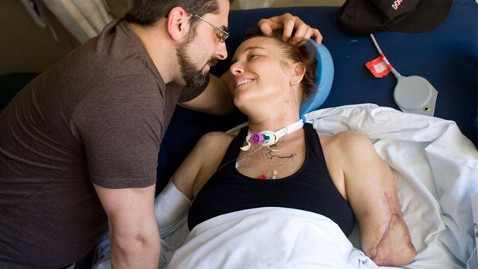Texas Woman to Receive Nation's First Double Arm Transplant

(Houston Chronicle)
Surgeons at Brigham and Women's Hospital in Boston will perform the nation's first double arm transplant on a Texas woman, the hospital announced Wednesday.
Katy Hayes, 44, a quadruple amputee and mother of three from Kingwood, Texas, has been approved for the transplant after undergoing rigorous evaluation.
In 2010, Hayes, a former massage therapist, developed a flesh-eating bacterial infection after giving birth to her third child. To keep her alive, doctors had to amputate her arm above the elbow, her legs above her knees, her uterus and her large intestines.
"I never thought about how much a gift your hands are," Hayes said at a news conference Wednesday. "I have to be baby-sat, which is ridiculous."
More than 48 patients worldwide have received hand and arm transplants. In 2009, the University of Pittsburgh Medical Center performed the nation's first bilateral hand transplant.
An above-the-elbow arm transplant similar to Hayes' proposed procedure has previously been performed in Munich, Germany, by Dr. Christoph Hoehnke.
The procedure will involve a team of 40 medical experts, doctors said at the news conference.
The transplant will connect skin, muscle, bones and blood vessels on both arms. While the surgery will repair the appearance of her arms, doctors are not sure whether full function of the arms will be restored.
Unlike internal organ transplants, hand and arm transplants not only depend on connecting the blood supply, but also on nerve regrowth for the arm to function normally, according to Dr. Vijay Gorantla, administrative medical director of the Pittsburgh Reconstructive Transplant Program at University of Pittsburgh Medical Center.
Nerves regrow about one millimeter a day, said Gorantla, who is not involved in Hayes' transplant, but was on the earlier double-hand transplant team.
"The recipient nerves have to regrow in the donor shell," said Gorantla, adding it could take years, if it happens at all. "At this point, there's no technology to expedite that growth."
"Theoretically, there's a risk that these patients may not be functional or as functional as a distal hand transplant," he said.
Research on hand and arm transplants has grown since the first transplant. Transplant patients often take multiple high-dose medications to prevent tissue rejection. Researchers at Johns Hopkins Medicine are researching ways to cut the number of high-dose drugs taken.
In a current study, Johns Hopkins researchers are treating patients with antibodies on the day of the transplant, followed by a bone marrow infusion after the transplant. Patients are then able to be treated with a single, lower-dose medication.
Doctors did not clarify Hayes' post-transplant recovery plans, but said the process to recovery will be a long one.
"I want my life back," said Hayes. "I want to hold my children. I want to hug my husband."
Dr. Bohdan Pomahac, director of plastic surgery transplantation at Brigham and Women's Hospital, the same pioneering surgeon who performed total face transplants to patients including Dallas Weins and Charla Nash, will be among Hayes' surgical team.
Brigham and Women's is working with the New England Organ Bank, a New England-based organ procurement organization, to find Hayes a donor.